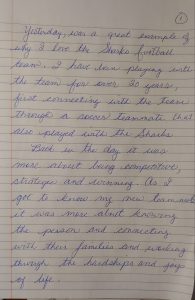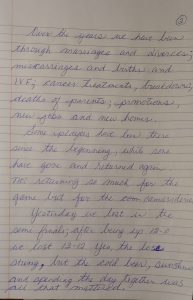The Sharks
 .
.  .
. 
Do you normally write by hand or type? Did you find this task difficult or easy? Explain.
By the nature of my job, I typically spend a lot of time typing, whether it’s for reports or emails. However, I notice that when I’m in a meeting and jotting down notes, I’m more inclined to do that by hand instead of using an app. Oddly enough, I am responding to this question using voice-to-text and then I’ll go in and fix it up just for fun.
I found the task at hand—pardon the pun—and writing manually quite easy. I probably take a lot of pride in my handwriting, a habit I developed as far back as grade four when cursive writing was part of the curriculum. I remember having to rewrite two full pages of ‘W’s’, until Mr. Towers deemed it was satisfactory (see image below). During the past eight courses in the MET program, I mostly took notes by hand in my Hilroy notebooks. It’s been only in the last two courses that I’ve switched to taking notes on my computer.
Week 3 Module: Language as Technology: Written Language, introduced us to Gnanadesikan (2011), Haas (2013), and Ong (2002). In their respective books, they mention the impact that written word has on memory over oral words. I too, feel that writing by hand helps with my memory, recall, and ability to find information later. Although the distinction between handwriting and mechanized writing is not addressed by these authors.
What did you do when you made a mistake or wanted to change your writing? How did you edit your work? Did your choice of media play a part in how you edited your work?
In this case, I thought out what I wanted to write about instead of it just being a total free write. When it came to spelling mistakes, I typically crossed out the incorrect word and continued writing. However, if I was unsure of the correct spelling, I would stop and look it up. I could have used simpler words, but I felt they wouldn’t do the piece justice. For instance, I chose the word “camaraderie” instead of “friendship.”
In some instances, I simply wrote the correct spelling over the incorrect one. For example, I changed “lose” to “lost” to “loss.”
I don’t think the choice of media played a significant role in how I edited my work. Instead, the formality of the work influenced my editing approach. Since I considered this a less formal piece of writing, crossing out words or writing over them was acceptable to me.
Other factors that might influence my editing include the audience, type of writing, quality of paper, and purpose of the writing.
What do you feel is the most significant difference between writing by hand and using mechanized forms of writing? Which do you prefer and why?
The most significant difference between writing by hand and using mechanized forms of writing is the personalized aspect of writing by hand. Handwriting carries the unique characteristics of an individual’s style, including the pressure of the pen, the angle of the strokes, and the idiosyncratic flourishes that make each person’s handwriting distinct. This personal touch can convey emotions and personality traits that are often lost in mechanized writing. This individuality in handwriting makes personal notes, letters, and journals particularly cherished, as they provide a tangible connection to the writer.
My sister had an uncanny ability to write. When I first moved to BC she would write me 17 pages letters. Alone in my apartment, I would read – laugh, cry and laugh again as would read the pages. It was just like she was there talking to me.



References:
Gnanadesikan, A.E. (2011). The first IT revolution. In The writing revolution: Cuneiform to the Internet (pp. 1-12). John Wiley & Sons.
Haas, C. (2013). The technology question. In Writing technology: Studies on the materiality of literacy (pp. 3-23). Routledge.
Ong, W.J. (2002). Chapter 1: The orality of language.Links to an external site. In Orality and literacy: The technologizing of the word (pp. 5-16). Routledge. (Original work published 1982).
Carol,
Great job on the completion of this task. You have such beautiful handwriting, which makes sense given that you have opted to keep utilizing it. Like the saying, ”if you don’t use it, you’ll lose it’. When I worked through this task, I struggled to write by hand as I have been typing everything for decades now. You mentioned that you often jot notes down by hand- do you print them or handwrite? I find that my students are always begging me to teach them handwriting, but I tend to go over it briefly towards the end of the year and opt to spend our precious literacy time on academic content. I also think that it’s important for them to learn how to type quickly, as this is a skill that they will be utilizing more frequently, and it makes operating the chromebooks a much less painful task. You spoke about the connection between writing by hand and memory in your post. I’m curious about how your experience has been now that you are typing more notes for school vs. handwriting. Do you feel that this has an impact with the way that you engage with the material?
Thanks’ Katy, for taking the time to read and respond to my post. Great questions, for me it made more sense to ‘type’ the notes as often I would ‘copy and paste’ something from Canvas that I felt was important, instead of handwriting it. It was more out of convenience, then memory. I have appreciated the quickness of retreiving the notes through a digital copy as opposed to the hand written ones (not to mention the environmental benefit of my digital notes). It’s not a natural process but I’m getting at it.